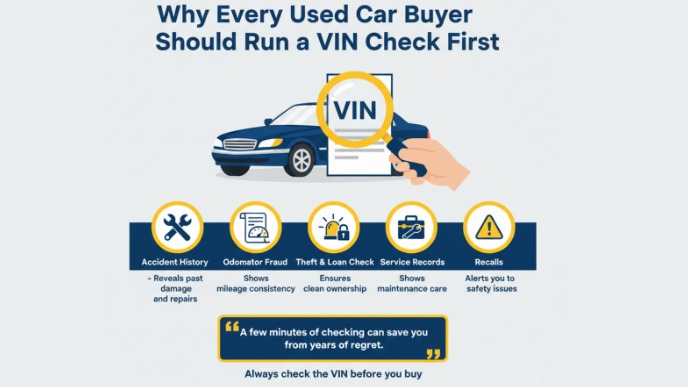Why Every Used Car Buyer Should Run a VIN Check First

I’ve seen it happen more times than I can count. Someone finds a used car that looks perfect, shiny paint, clean seats, smooth drive and they rush to buy it. A few months later, they’re stuck with engine issues, unpaid loans, or a car that was once in a major crash.
All because they skipped one simple thing: the VIN check.
Running a VIN check before buying a used car isn’t just smart — it’s necessary. It takes a few minutes and can save you from a world of trouble.
What a VIN Actually Is
Every car has a VIN (Vehicle Identification Number), it’s basically its personal ID number. And we can call it fingerprint means it is unique to that car alone.
Check the dashboard near the windshield or the driver’s door frame for it.
You can also find it on your registration and insurance documents.
Those 17 digits can tell the whole life story of a car like its factory details, past owners, and everything it’s been through.
What a VIN Check Tells You
Think of a VIN check like opening a car’s diary. It doesn’t just show you mileage or ownership; it shows its entire story.
You’ll see if it was ever in a crash, declared a total loss, stolen, or used for business and even if it has functional damage listed in the CARFAX report.. It might even show if it was flooded or had odometer fraud.
That’s powerful information for anyone who doesn’t want surprises later.
Why It’s So Important
You might think, “The car looks fine. Why bother?” Well, not all damage is visible. Paint hides a lot.
A VIN check gives you proof. It helps you confirm whether what the seller says matches reality. Some people hide details on purpose — others just don’t know. Either way, this one report keeps you safe.
Accidents and Hidden Damage
A car can look brand new but still have an accident history.
Repairs and polish can hide the damage, but not always fix it.
A VIN report shows you the full story, when and where the crash happened and what was broken, so you can make a smart choice.
Odometer Tricks Are Still Out There
It’s shocking, but yes some sellers still roll back odometers to make the car look newer.
A VIN check tracks mileage from previous checkups or repairs.
If the numbers seem off, that’s a warning sign.
You don’t need to argue as the report shows the full picture.
Avoiding Stolen Cars
There are still people selling stolen cars online. They change the plates, fake the papers, and sell it to someone who doesn’t know better.
If police find it later, the car goes back to the rightful owner — and you lose your money.
A VIN check connects to national databases that list stolen vehicles. It’ll tell you instantly if the car’s clean or not.
The Truth About Titles
A clean title means the car’s ownership is clear. But if a car was wrecked, flooded, or burnt, it might have a “salvage” or “rebuilt” title.
Some sellers move the car to another state to hide that. But a VIN report shows every title change.
If you skip this check, you could end up with a car you can’t insure or resell easily.
Recalls That Go Unnoticed
Not every car owner follows up on recalls. Some ignore them completely. That means a safety problem could still exist.
A VIN check lists all recalls and shows if the repairs are done.
It’s the simplest way to know your car is safe before buying.
Ownership History
Was it a single-owner car? Or did it pass through five different hands? That makes a big difference.
A one-owner car usually means consistent care. A car with too many owners in a short time might mean trouble.
A VIN report gives you that history. It’s like seeing the car’s family tree.
How the Car Was Used
Not all used cars live the same life. Some are rentals, taxis, or fleet cars. They often rack up miles fast and go through more wear.
A VIN check shows how the car was used. You’ll know if it lived an easy life or a rough one.
The Service Record Says a Lot
A car that’s been serviced regularly is a good sign. Oil changes, brake replacements, tire rotations — all show care.
Many VIN reports show those records. If you see long gaps, it might mean poor maintenance. That’s a red flag worth noticing.
What It Costs vs. What It Saves
A VIN report isn’t free, but it’s cheap compared to what you might lose.
You can get a full car history for the price of a pizza.
A little money now can save you big worries later.
If the report shows a big problem, you’ll be glad you checked before paying.
Where to Run a VIN Check
Plenty of sites can help — CARFAX, AutoCheck, or CheapCarfaxReport.com are common choices. Just enter the VIN, pay the small fee, and get the report instantly.
Some free tools exist, but they don’t always give the full story. A paid one gives you everything you need to know.
When the Seller Hides the VIN
If a seller refuses to share the VIN, stop right there. That’s not normal.
Honest sellers will always give it. Hiding it means there’s something wrong — maybe a fake title, stolen parts, or legal issues.
Walk away. Don’t risk it.
What Happens If You Skip It
Skipping the VIN check can be one of the biggest mistakes you make. You might end up with a car you can’t register or sell.
Some people only realize this months later when they try to renew papers or get insurance. By then, the money’s gone.
Checking first saves you that pain.
It’s About Confidence, Not Distrust
Doing a VIN check isn’t about thinking everyone’s lying. It’s simply about being careful with your money.
Once you know what the car has been through means you found the history, you can make a sure and safe choice.
You can buy with your eyes open instead of hoping for the best.
Final Thought
Every used car has a past. Some stories are clean, some are messy. You just need to know which one you’re buying.
A VIN check tells you that story. It’s a simple step that can save you from huge regrets. No matter if it’s your first car or your fifth, always check before you buy.
Once it becomes your habit, you won’t get tricked by a bad deal again.



